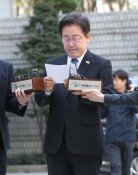Finance minister's top priorities
Finance minister's top priorities
Posted April. 18, 2016 07:36,
Updated April. 18, 2016 07:39
While Korean Finance Minister Yoo Il-ho is currently visiting in the U.S. to participate in the G20 Finance Ministers' Meeting, U.S. Secretary of Treasury Jacob Lew told Yoo on Friday (local time), "I have been monitoring Korea's exchange rate policy, and I think that you need to make your policies more transparent." This remark made Korea's foreign exchange authorities feel uncomfortable as the U.S. will soon announce a semiannual report on exchange rates. The Korean Ministry of Strategy and Finance does not think that Korea will be included in the list of currency manipulators, but we cannot be so sure yet. If the U.S. brands Korea as a currency manipulator, based on the Bennet-Hatch-Carper Amendment that passed the U.S. congress, Korea might have to face trade retaliation.
The U.S. Treasury Department did not brand Korea as a currency manipulator in the April report last year, but it did warn about the foreign exchange authorities' market intervention. They also gave us the same warning last October by saying that as the Korean government continues intervening in the foreign exchange market, transparency is needed on currency manipulation. They were going to make it an issue in the joint statement for the Korea-U.S. summit in the same month, but changed their mind at the last minute as Korea was opposed to it. On the other hand, the U.S. seems to tolerate Japan and China's similar actions. Japan has weakened the yen purposely and plainly for export expansion for the past three years since the inauguration of the Abe Shinzo's administration. China devaluated the yuan last year and this year. This tells us that Korea's economic diplomacy is not working well.
At a press conference in Washington, Minister Yoo stated, "We cannot postpone the industrial restructuring of oversupplied businesses and weak businesses anymore." He added that he would do the job himself since the situation is so critical that he cannot let insolvent companies restructure themselves. Yoo has been serving as the prime minister for almost 100 days. In January this year, before his confirmation hearing, he pledged that he would "push forward in restructuring marginal businesses without mistakes." However, before the general elections, he avoided the task because he was "occupied with politics."
Economic experts consider "industrial restructure" as the most urgent task in order to ensure Korea's long-term growth. The International Monetary and Financial Committee, which is the consultative body of International Monetary Fund, also emphasized structural reform as well as growth-friendly financial policies in its joint statement announced on Saturday. There is a high chance, next year before the presidential election, that politicians might enforce the cancellation of structure reform in the shipping, shipbuilding, and steel industries. That means the remaining "golden time" is eight months by the end of this year. If the government and politicians miss the right time for restructuring, the Korean economy will sink deep into the mire.
권순활논설위원 shkwon@donga.com







